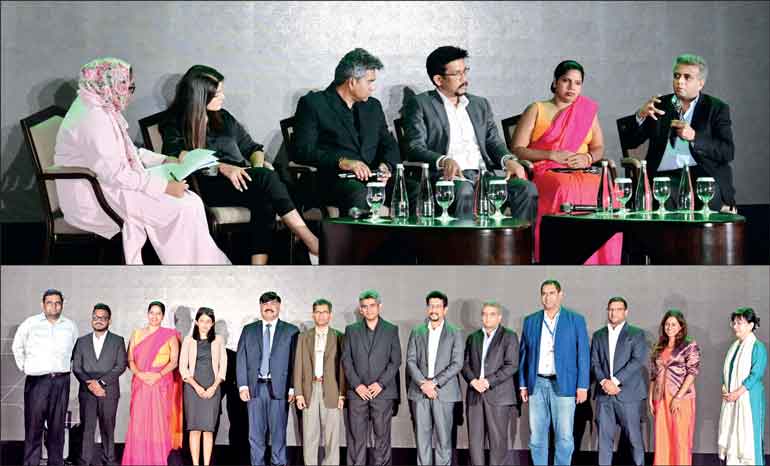Monday Feb 16, 2026
Monday Feb 16, 2026
Wednesday, 6 August 2025 00:00 - - {{hitsCtrl.values.hits}}

Uber Springboard 2025 Winners
 |
| Digital Economy Deputu Minister Eng. Eranga Weeraratne |
 |
| Uber South Asia Public Policy Director Sanjaya Chadha |
 |
| Uber Sri Lanka Delivery Country Manager Varun Wijewardene |
By Safna Malik
Uber, the international ride-hailing and delivery platform, recently held the second edition of its Uber Springboard initiative.
This program aims to support Sri Lankan entrepreneurs through mentorship, guidance, and international exposure.
Partnering with the Technology Ministry’s Department of Digital Economy, this year’s edition saw more startups participating, building on the success of last year.
Five startups were chosen from over 25 Sri Lankan ventures this year after a competitive process involving Uber’s leadership and external experts.
These selected startups are now set to be onboard on an all-expense-paid exposure tour to Hyderabad, India, a key tech hub, for a dedicated mentorship experience at Uber’s Tech Centre of Excellence.
The five selected startups are:
The mentorship program is set to cover key areas such as product development, growth strategy, fundraising, and team building. This initiative is part of Uber’s ongoing commitment to supporting Sri Lanka’s startup ecosystem.
Addressing the audience, Uber Head of Public Policy, India and South Asia, and Government Relations Sanjay Chadha stated that the Uber Springboard winners gain a unique chance to network in Hyderabad, a high-tech city in India, which hosts global giants, industry leaders, investors, and incubators, including T-Hub, Microsoft, and Google.
He said, noting the opportunity for exposure, as well as many startups from India and beyond. Chadha also highlighted the strong support from the Digital Economy Ministry, which helped bring the Uber Springboard initiative to life.
“Uber began as a small idea to move people more efficiently and safely,” Chadha stated, “Fifteen years later, now we’re helping others bring their big ideas to life.”
Uber Springboard 2025 event was held at ITC Ratnadipa Colombo, with a 45-minute panel discussion with industry leaders.
The panel featured: Digital Economy Deputy Minister Eng. Eranga Weeraratne, Chief Advisor to the President on Digital Economy Dr. Hans Wijayasuriya, Uber Senior Tech Director Manikandan Thangarathnam, Typefi Vice President and Women in Tech Sri Lanka Ambassador Chathini Uduwana, and Ceylon Speechie Founder Dr. Nadini Perera Wickramasingha. The discussion was moderated by Cambridge University Country Head for Sri Lanka and the Maldives Zahara Ansary.
The panel discussion started with a thought-provoking title, “From Ideas to Impact: Driving Tech Entrepreneurship and Innovation in Sri Lanka”.
Speaking at the event about winning as a venture in Uberspring Board 2025 and the journey involved in gaining exposure as a startup, Dr. Nadini Perera Wickramasingha described entrepreneurship as often being a “lonely game”.
She highlighted that the Uber Springboard provided crucial international exposure, with international judges, which made her feel her services could reach beyond local borders. She called the experience “absolutely rewarding as well as very fulfilling”.
Encouraging female participation in entrepreneurship Dr. Wickramasingha pointed out the unique challenges for women balancing entrepreneurship with other life roles, stating: “I’m a wife, I’m a mother, with all these responsibilities going forward as an entrepreneur wasn’t easy, it’s a different ball game altogether for a female, because that’s not the only thing you’re doing in life.”
The presence of initiatives like Uber Springboard and other ecosystems really help females like us to evolve, and “I’m proud and happy to represent female entrepreneurship.”
Adding more insights to scaling up and women’s role in business Dr. Wickramasingha shared her personal journey of shifting from a passionate clinician to understanding business scaling.
She believes that digitalising professional services offers a huge market for scale, especially in Sri Lanka, which is a service-oriented country.
She also pointed out the potential of investing in women in business and digital literacy, stating that “women have an amazing ability to expand what’s given to them.”
Highlighting the common challenges for new founders Chathini Uduwana pointed out key “blind spots” for first-time founders beyond their initial domain knowledge. She highlighted challenges such as developing leadership skills, understanding scaling strategies, managing accounts, and effectively pitching their ideas.
Uduwana stressed that “just having a great idea is not enough,” and noted a lack of originality in many Sri Lankan startups. She advised founders to seek more exposure, continuously learn, and transition from a micro-management mindset to a broader oversight as their ventures grow.
On strengthening the startup ecosystem for global competitiveness Dr. Hans Wijayasuriya stated that Sri Lanka possesses abundant tech talent, particularly in areas like AI, noting its strong presence. He emphasised that the key challenge is converting this talent into viable businesses at a global scale.
Dr. Wijayasuriya explained that the competitive environment is global, not confined to the island, and failure to build a globally competitive ecosystem would mean losing out on market opportunities and being “swallowed up by global competitors”.
He mentioned that the Government is actively focusing on removing obstacles for startups and investors to facilitate rapid global growth.
He further asserted it’s about “unlocking” the fundamental potential of Sri Lankan talent and encouraging venture capital funds, incubators, accelerators, and initiatives like Uber Springboard to enrich the entire ecosystem.
He also highlighted the Government’s role in removing existing obstacles and empowering all stakeholders.
Addressing the question of what immediate moves can be expected through Government initiatives to support startups and encourage partnerships like Uber, Deputy Minister Eng. Eranga Weeraratne highlighted Uber Springboard as a prime example of effective industry-Government collaboration.
He stated, “Startups are vital problem-solvers, and connecting them with experienced mentors gives them a stronger foundation to scale. Uber’s continuous investment in our startup talent helps unlock the creativity and ambition of our tech community.”
The Deputy Minister acknowledged that while good ideas are widespread, they require “infrastructure, mentorship, partnerships like Uber” to materialise.
He explained that despite significant innovation and research at university and school levels, the local ecosystem for capital investment, mentorship, and handholding is not yet fully developed for startups to sustain.
The Deputy Minister pointed out that many Sri Lankan innovators move their headquarters overseas due to a lack of a fully developed local ecosystem for capital and sustained growth.
To address this issue, the Government plans to initiate a fund to encourage global venture capitalists to invest in Sri Lankan companies, aiming to keep small and medium-scale startups headquartered locally while still enabling global expansion.
He highlighted the importance of companies like Uber providing mentorship and international exposure, especially within global startup incubators, to help Sri Lankan founders professionalise and envision their path to becoming global unicorns one day.
Speaking about the Government’s efforts in terms of making innovation more equitable outside Colombo, the Deputy Minister stated that programs should not be confined to the capital but must extend across the country.
He announced September as “Digital Month”, to be followed by a 100-day program aimed at promoting digitalisation and fostering enthusiasm within society. This will include a series of outreach programs in areas such as Jaffna, Galle, Kandy, and other regions to identify talent and bring digital education to rural areas.
The Deputy Minister mentioned plans to extend FinTech forums beyond Colombo.
He highlighted the existence of a business incubation facility in Jaffna, developed by a young entrepreneur, and affirmed the Government’s intention to support such regional groups.
He explained that initiatives like “fund of funds” programs would be taken to the village level to encourage the adoption of AI technology for innovation in the digital space, as well as its use in the day-to-day work of both Government employees and the private sector.
Furthermore, he stressed the necessity of revamping school curricula to integrate technology into the educational system islandwide.
He said that national task forces have been established to identify the necessary educational reforms, which will ensure technology reaches students across the entire country.
Highlighting a major topic on people’s view towards entrepreneurship and certain industries and roles, Chathini Uduwana emphasised the national need to change perceptions.
She cited an example dating back decades of negative societal views towards women working in apparel factories; however, she noted that this perception has since shifted, largely because the media actively showcased the hardships, lifestyles, talent, and abilities of these women.
This shift encouraged more women to pursue jobs in garment factories rather than staying home, demonstrating their desire to learn skills and evolve.
She added that misconceptions and social judgment often hold women back from being financially independent.
Bringing the importance of such encouragement in the current context a similar “cultural shift” is required for the tech and startup culture in Sri Lanka.
She pointed out that while educated individuals in Colombo might be exposed to entrepreneurial ideas, the broader population, particularly parents, often discourage their innovative children from pursuing startups due to concerns about market security, setbacks, and preferring traditional career paths.
She said a national change in perception, supported by the Government, is crucial for the country’s innovation landscape.
Speaking about how support for startups has been increasing over time, Dr. Wickramasingha shared her personal experience, noting that despite coming from a medical, non-tech background, her venture gained prominence due to the existing ecosystem.
She explained that during COVID-19, she had to close her physical clinics and move online, which unexpectedly revealed the potential for her services to reach beyond Sri Lanka, including tapping into the global insurance market.
Dr. Wickramasingha asserted that noteworthy ventures now receive significantly more support than ever before.
She further highlighted that even without a tech background, she received crucial technical support and assistance in fundraising, mentioning that the Information Communication Technology Agency (ICTA), which recognised her with a national award, specifically encouraged her to develop her professional service into a tech product, highlighting how these ecosystems led her venture forward.
Explaining what it takes for a founder to go from building a product to building a company, Manikandan Thangarathnam outlined five parameters which he identified as: money, people, the founder’s drive, the idea, and the surrounding ecosystem.
Thangarathnam mentioned that the need for significant capital for a startup has been reduced, with the easy accessibility for services like cloud computing and AI tools.
Building a prototype no longer requires thousands of dollars in hardware, making it far easier to test ideas.
Similarly, he stated that the requirement for large teams has drastically decreased.
Previously, building a company might need 15-20 people for various roles like UX design, product management, sales, and marketing.
Now, he suggested, AI tools can handle “at least 80% of these roles”, allowing a company that once needed hundreds of employees to operate effectively with just 10 to 15 people, reducing costs by 60-70%.
The third element, according to Thangarathnam, is the founder’s personal drive. He emphasised that the founder must be “really passionate” about their vision, remaining “rigid on their vision” but “very flexible on the execution” to navigate the inevitable ups and downs.
Regarding the idea, Thangarathnam advised founders against spending excessive time searching for a completely “new idea”.
He asserted that the true differentiator is often execution. He explained that many companies might solve the same problem, but the one that wins is the one that “actually executes and drives the option.”
He suggested that entrepreneurs should view any “hindrance to the normal way that we live” as an opportunity for an idea.
He said Sri Lanka offers a “green field area” with ample opportunities for founders to implement and execute ideas.
Thangarathnam highlighted the extreme criticality of the ecosystem. He shared that the Uber Springboard program in Sri Lanka is a “very unique initiative” that Uber is not currently doing in other countries.
He expressed his appreciation for the Sri Lankan Government’s support in making the initiative happen.
Thangarathnam said that with founders possessing a “relentless vision”, coupled with Government support and the assistance of a multinational company like Uber, an idea can indeed be successfully translated into a product and then a thriving company.
He also encouraged new entrepreneurs to fully use the existing support from the Government, industry, and available tools, suggesting that the next two years offer a chance to “transform the entire startup ecosystem in Sri Lanka.”
Giving insights on how to build stronger mentorship pathways, Dr. Hans Wijayasuriya emphasised the crucial role of universities and early education.
He stressed the importance of teaching core entrepreneurial disciplines, such as problem-solving, ensuring solutions address existing problems, product-market fit, and understanding scalability, including “knowing when to call it a day” if a product or scalability is not viable.
Dr. Wijayasuriya argued that educators should instil basic methodical thinking about opportunities, solutions, and scalability from an early stage, even in schools and universities.
He firmly believes that initiating these steps would significantly “increase the probability of success” for startups, as the current “hit rate” in the Sri Lankan startup ecosystem needs to be much higher.
Responding to a question on how to ensure the next wave of startups includes more women, underrepresented groups, and regional talent, Chathini Uduwana noted that despite a high percentage of female graduates, particularly those excelling in academic results, their representation in the industry and startup ecosystem remains low.
Uduwana stated that Sri Lanka’s female labour force participation stands at only 32%, posing a critical question about why educated women are not joining the workforce.
She expressed the difficulty in finding female entrepreneurs for programs and even female talent for panel discussions, indicating a notable gap despite efforts from both public and private sectors to encourage women’s participation.
Uduwana acknowledged that equal opportunities likely exist but are not being fully utilised. She suggested that this phenomenon requires further study to understand underlying issues.
From her perspective in the tech sector, she observed that career longevity among women seems to have decreased over the last 15 years, with many staying in the market for only two to three years before resigning. This raises questions about resilience in entrepreneurship.
Uduwana attributed this, particularly in South Asian countries like Sri Lanka, to “untouched cultural, societal, stereotypes and a lot of expectation”.
She pointed out the low number of female middle managers and the much lower representation of women in C-suite and boardroom levels.
She stressed that if this trend could be changed, it would be “for the greater good” of the nation.